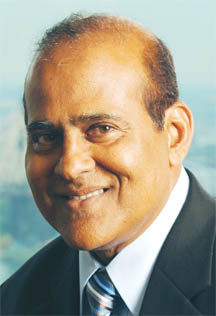The Transparency Institute of Guyana Inc. (TIGI) has been hard pressed in finding persons willing to join its ranks and TIGI President Anand Goolsarran says the government’s posture towards the organisation has cast it in a negative light.
As a result, TIGI is perceived, even by international operators, negatively. Goolsarran, in particular, has been the subject of character attacks by government spokespersons.
TIGI was officially launched on September 3rd, 2011 to push for transparency, accountability and anti-corruption standards from both public and private sector officials in order to promote good governance.

During a function at which TIGI shared with the public Guyana’s score on Transparency International’s 2013 Corruption Perception Index (CPI) last Tuesday, Goolsarran noted that one person he spoke to about joining TIGI told him that he wanted to keep his job.
As a result, TIGI’s membership has stagnated, said its Vice-President Frederick Collins. Despite these realities, analyst and charted accountant Christopher Ram, who was present at the function, told Goolsarran that the organisation needs to push ahead, even in light of the inhibiting factors, as there are many who share the sentiments of the organisation and are willing to lend their services to the cause.
TIGI Board Director Esther Mackintosh noted Ram’s point but pointed out that the membership of the NGO has not expanded beyond 50 for some time. This, she said, coupled with the fact that TIGI is quite underfunded inhibits it from doing as much as it would have liked to be doing to combat corruption in Guyana.
AFC Leader Khemraj Ramjattan, who was also present at the function, suggested that one of the things the organisation ought to be doing is sensitising the “grass-roots” about the reality of corruption in Guyana, and its implications. He said that the way such information is presented by the media may not be easily understandable and noted that the state media bodies can even make it seem as though corruption does not exist.
Breaking the facts down, Ramjattan urged, and presenting it to cane cutters and other persons in these categories would achieve much in terms of sensitising the Guyanese populace on the reality of corruption, thereby informing their perception on the matter.
Avoiding conflict of interest
Goolsarran is a former Auditor General and has served in several other capacities relating to Guyana’s financial and tendering system. As a result, that the AFC named him as one of its two nominees to the Public Procurement Commission (PPC). The other is Ram.
The main opposition APNU has also identified its picks for the commission while the ruling PPP/C is yet to do the same.
Assuming that the nomination process is ever completed, the names will be sent to the National Assembly where two-thirds of the House will be required to give their approval before the process goes any further.
If and when the process gets that far, and, if Goolsarran decided to accept the nomination, he says that remaining the President TIGI and continuing his weekly column in which he pronounces on issues of public interest would create a conflict of interest situation. Serving on the Commission would require him to be independent and impartial, and since his work with the Non-Governmental Organisation and his columns are perceived by some as partisan, discontinuing both would be prudent, he indicated.
But, he said that he is yet to make up his mind on what decision he will make, and since it seems that the PPC is no closer to being set up than it was 10 years ago, it is unlikely that he will be required to make that decision anytime soon.
Earlier this year, Goolsarran had written to the AFC asking that it consider replacing him as the party’s nominee to the PPC, saying he had been the victim of attacks and ridicule from the government, its youth arm and the government-controlled media since he was identified as a nominee.
The PPC, which would be tasked with combatting any corruption in the public procurement process once set up, was provided for in the constitution on the recommendation of the Constitution Reform Commission in 2000. The recommendation came at a time when it was perceived that corruption was widespread and growing. But more than 10 years later though, the Commission is yet to be set up as the process has been beset by a plethora of problems.
During the Ninth Parliament President Donald Ramotar, then a government MP, blamed the PNCR’s insistence on unanimity for the delay in setting up the Commission, but today it is the government which is perceived as the impediment. The Ramotar administration has not acted on promises by its spokespersons to move forward with the setting up of the PPC and Presidential Adviser on Governance Gail Teixeira earlier this year even said that the commission is not a priority.
Progress with regard to the setting up of the body now seemingly turns on the government being allowed to keep its “No Objection” powers in the procurement process.





